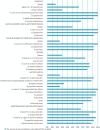STOPPFall (Screening Tool of Older Persons Prescriptions in older adults with high fall risk): a Delphi study by the EuGMS Task and Finish Group on Fall-Risk-Increasing Drugs
- PMID: 33349863
- PMCID: PMC8244563
- DOI: 10.1093/ageing/afaa249
STOPPFall (Screening Tool of Older Persons Prescriptions in older adults with high fall risk): a Delphi study by the EuGMS Task and Finish Group on Fall-Risk-Increasing Drugs
Abstract
Background: Healthcare professionals are often reluctant to deprescribe fall-risk-increasing drugs (FRIDs). Lack of knowledge and skills form a significant barrier and furthermore, there is no consensus on which medications are considered as FRIDs despite several systematic reviews. To support clinicians in the management of FRIDs and to facilitate the deprescribing process, STOPPFall (Screening Tool of Older Persons Prescriptions in older adults with high fall risk) and a deprescribing tool were developed by a European expert group.
Methods: STOPPFall was created by two facilitators based on evidence from recent meta-analyses and national fall prevention guidelines in Europe. Twenty-four panellists chose their level of agreement on a Likert scale with the items in the STOPPFall in three Delphi panel rounds. A threshold of 70% was selected for consensus a priori. The panellists were asked whether some agents are more fall-risk-increasing than others within the same pharmacological class. In an additional questionnaire, panellists were asked in which cases deprescribing of FRIDs should be considered and how it should be performed.
Results: The panellists agreed on 14 medication classes to be included in the STOPPFall. They were mostly psychotropic medications. The panellists indicated 18 differences between pharmacological subclasses with regard to fall-risk-increasing properties. Practical deprescribing guidance was developed for STOPPFall medication classes.
Conclusion: STOPPFall was created using an expert Delphi consensus process and combined with a practical deprescribing tool designed to optimise medication review. The effectiveness of these tools in falls prevention should be further evaluated in intervention studies.
Keywords: accidental falls; adverse effects; aged; deprescribing; fall-risk-increasing drugs; older people.
© The Author(s) 2020. Published by Oxford University Press on behalf of the British Geriatrics Society. All rights reserved. For permissions, please email: journals.permissions@oup.com.
Figures




Comment in
-
Focusing on medications that increase the risk of falls in older adults.Eur Geriatr Med. 2021 Aug;12(4):671-672. doi: 10.1007/s41999-021-00448-w. Eur Geriatr Med. 2021. PMID: 33956336 No abstract available.
References
-
- Centers for Disease Control and Prevention . Injury Prevention & Control. Keep on your feet - Preventing Older Adult Falls. https://www.cdc.gov/injury/features/older-adult-falls/index.html. (20 April 2020, date last accessed).
-
- de Vries M, Seppala LJ, Daams JG et al. Fall-risk-increasing drugs: a systematic review and meta-analysis: I. cardiovascular drugs. J Am Med Dir Assoc 2018; 19: 371 e1–9. - PubMed
-
- Seppala LJ, Wermelink A, de Vries M et al. Fall-risk-increasing drugs: a systematic review and meta-analysis: II. Psychotropics. J Am Med Dir Assoc 2018; 19: 371 e11–7. - PubMed
-
- Seppala LJ, van de Glind EMM, Daams JG et al. Fall-risk-increasing drugs: a systematic review and meta-analysis: III. Others. J Am Med Dir Assoc 2018; 19: 372 e1–8. - PubMed
Publication types
MeSH terms
Substances
LinkOut - more resources
Full Text Sources
Medical

